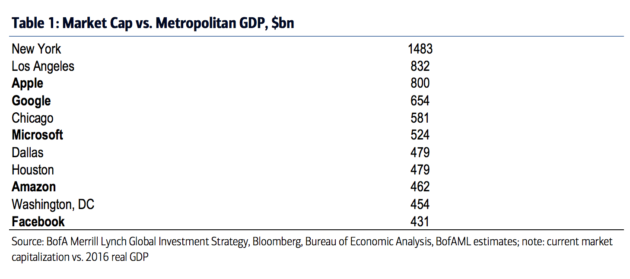
The world’s largest tech companies are worth more than the gross domestic product (GDP) of most U.S. cities, according to new research from Bank of America Merrill Lynch.
The report, titled “Occupy Silicon Valley,” compares the market caps of tech giants to the GDPs of the top U.S. cities. By that metric, Google and Apple are worth more than all U.S. cities except Los Angeles and New York (those with the largest economies).

Microsoft is outpaced by just L.A., New York, and Chicago. Amazon’s value is greater than the GDP of Washington, D.C. What’s more, the combined market cap of Google and Apple is larger than the combined market cap of Eurozone and Japanese financials, according to the report.
The stats reflect a trend of the nation’s wealth becoming increasingly concentrated in a handful of companies in tech hubs, like Seattle and Silicon Valley. This trend could have serious consequences, according to the analysts who prepared the report, particularly considering the current U.S. political climate.
Here’s how Michael Hartnett, Bank of America Merrill Lynch’s chief investment strategist, characterize the phenomenon in the report:
Renewed leadership of ‘Creative Disruption’ vs ‘Economic Nationalism’ is ultimately unsustainable. It will engender a more forceful inflationary policy response for the political establishment: monetary & fiscal policy moving left, trade & immigration policy moving right. In addition, it could ultimately lead to populist calls for redistribution of the increasingly concentrated wealth of Silicon Valley as the gap between tech capital & human capital grows ever-wider.
We’re already seeing deep divisions between the nation’s economically vibrant tech regions and struggling rural communities, which helped spur the rise of Trump-era populism. But GDP is not the only metric of a city’s value.
“Amazon is not, for example, actually more valuable than its home base of Seattle, as metropolitan GDP doesn’t account for broader economic or security values (let alone real estate, infrastructure, etc.),” writes Axios’s Dan Primack, who first spotted the Bank of America Merrill Lynch report.



